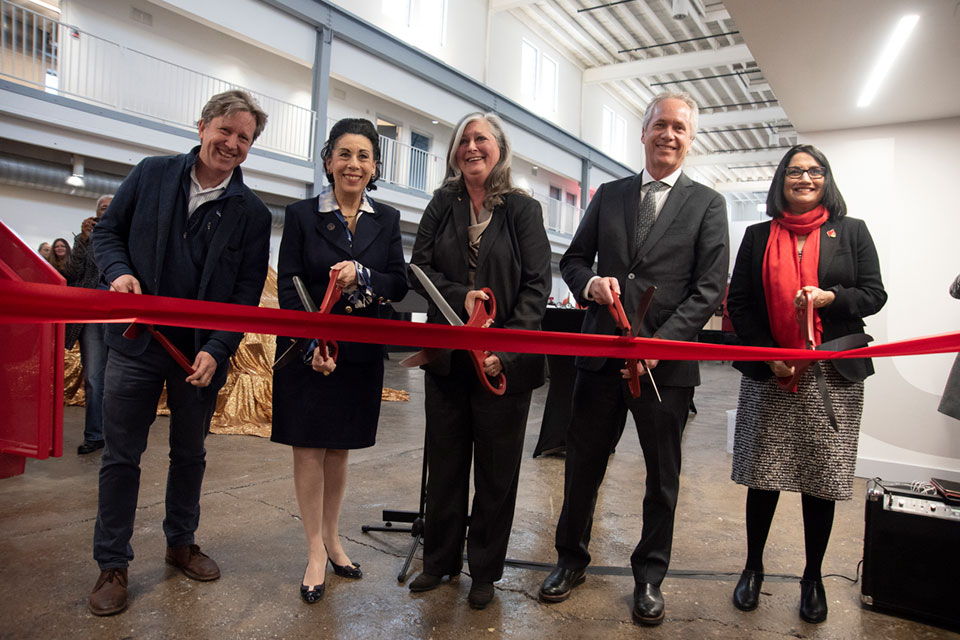MFA, Archaeology and Urban Design Studio programs moving to West Louisville
Visit uofl.me/as-growwest to learn more about the MFA, Archaeology and Urban Design Studio programs, to see progress photos of the building under construction, and for giving/naming opportunities.
An 1880s brick warehouse nestled in Louisville’s Portland neighborhood has been transformed into space for College of Arts and Sciences students and faculty to create art, honor and learn from history and develop partnerships for the future.
City and university officials, along with building owner/developer Gill Holland, ceremonially snipped the red ribbon March 5 to welcome guests to the newly renovated space. Fine arts and archaeology students have settled in this semester to make a home for programs that outgrew Belknap Campus facilities.
“We’re super excited to be here,” Dean Kimberly Kempf-Leonard told the crowd in thanking people who contributed to the years-long effort. “This is a proud moment for many here.”
UofL is leasing most of the space, about 43,000 square feet, from the Rowan Downstream LLC group that includes Holland, noted for revitalization efforts in Portland and NuLu sections of the city. The building retains some elements that reflect its former uses over time including steamer trunk factory, floor-covering distribution business, storage warehouse and senior nutrition center.
“When you walk in here, you go ‘Wow,’” said Mayor Greg Fischer, also joined by Metro Councilwoman Barbara Sexton Smith at the ceremony.
Now its second-floor mezzanine is rimmed with graduate student and faculty studios and offices associated with the UofL Hite Arts Institute’s master of fine arts degree in studio arts and design, an MFA program that began in 2014. Below that are exhibition spaces and larger studios for media including ceramics, glass, wood, metal, printmaking and digital art.
“You can feel the creative energy. You can see the amazing art,” Holland said.
In another wing, the university’s collections of hundreds of thousands of artifacts have been relocated to climate-controlled rooms to better protect them for the future and future study. Archaeology students and faculty from the anthropology department will use six new laboratories – some for instruction and some for sample preparation and artifact cleaning – for their research and teaching. Planners there expect to do more outreach to interest and interact with the neighborhood residents, particularly schoolchildren, according to Thomas Jennings, an assistant professor working in the renovated facility.
Other UofL students benefiting soon from the Portland space will be from the urban and public affairs department. The Urban Design Studio, which researches and raises community awareness of better, more sustainable design practices, has relocated there from its former leased downtown space. Studio director Patrick Piuma echoed the hope for more collaboration across the academic disciplines thanks to the new proximity and envisioned possibilities for public art or neighborhood projects tackled together.
“I’ve always wanted to integrate more with others,” he said. “Now it’s an opportunity to interact on a daily basis.”

Gill Holland, Metro Councilwoman Barbara Sexton Smith, Dean Kimberly Kempf-Leonard, Mayor Greg Fischer and President Neeli Bendapudi prepare to cut the ribbon for renovated Portland space.
At the ribbon-cutting, UofL President Neeli Bendapudi commended those who had the vision to see potential for the university’s presence in the Portland space. “This is a university that I promise you is going places.”
“This is a town-gown relationship at its best,” she said.
Many people at the ribbon-cutting remained for the first large public event in the space – Bendapudi’s lecture on “The Liberal Arts in a Global Economy.” Her talk was the 14th annual Phi Beta Kappa lecture, which the College of Arts and Sciences offers with the Phi Beta Kappa Association of Kentuckiana.
Check out highlights from the ribbon-cutting event below.
In the News
UofL expands west with new Portland art studio
WAVE3 News
Step inside U of L's revamped warehouse space in Portland (photos)
Louisville Business First
